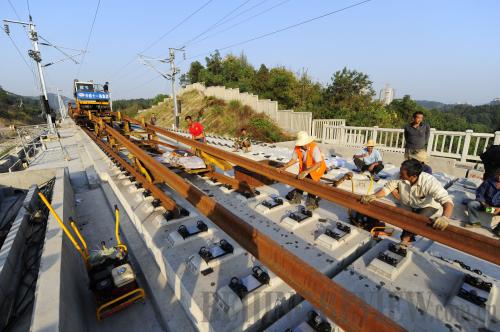|
 |
|
INTERCITY RAILWAY: The Wuhan-Huangshi Railway is under construction. Connecting the two cities in Hubei Province, it will greatly shorten travel time for local residents when completed (HAO TONGQIAN) |
London's Yuan Hub
China and the UK on October 15 agreed to continue to build London into a major offshore market for yuan trading, underlining the strong financial ties between the two countries.
Both sides welcomed strong growth of London's yuan markets, making the capital city the most active yuan center in the world outside China, according to a joint statement following the Fifth China-UK Economic and Financial Dialogue held in Beijing.
To boost London's market status, China will give investors based in the city the right to buy 80 billion yuan ($13.12 billion) worth of stocks, bonds and money market instruments issued by financial institutions on the Chinese mainland through a regime called RQFII, or Renminbi Qualified Foreign Institutional Investor.
The extension of RQFII will deepen China's financial markets and strengthen yuan activity offshore, the statement said.
In addition, both sides agreed to support further yuan bond issuance in the UK by Chinese as well as international firms, and the development of London as an offshore yuan debt issuance center.
Oil Refinery Project
The Export-Import Bank of China on October 16 signed an agreement to fund a $1.67 billion-loan to a Cambodian company for the construction of an oil refinery.
The agreement came after the Cambodian Petrochemical Co. and several Chinese firms signed in April a Memorandum of Understanding to jointly build a 5-million-ton oil refinery project in Cambodia.
Currently, Cambodia imports all its oil and gas from Viet Nam, Singapore and Thailand as its seabed's oil and gas have not been exploited.
In 2012, Cambodia spent $1.62 billion on importing about 1.65 million tons of oil, according to official data. During the first eight months of this year, the nation imported 1.1 million tons of oil, costing $1.04 billion. The Cambodian Government estimated that the demand would increase up to 4 million tons a year in the coming time thanks to rapid economic growth. | 